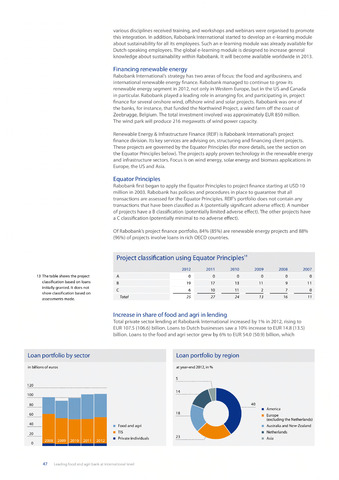Financing renewable energy
Equator Principles
Project classification using Equator Principles13
Increase in share of food and agri in lending
Loan portfolio by sector
Loan portfolio by region
various disciplines received training, and workshops and webinars were organised to promote
this integration. In addition, Rabobank International started to develop an e-learning module
about sustainability for all its employees. Such an e-learning module was already available for
Dutch-speaking employees. The global e-learning module is designed to increase general
knowledge about sustainability within Rabobank. It will become available worldwide in 2013.
Rabobank International's strategy has two areas of focus: the food and agribusiness, and
international renewable energy finance. Rabobank managed to continue to grow its
renewable energy segment in 2012, not only in Western Europe, but in the US and Canada
in particular. Rabobank played a leading role in arranging for, and participating in, project
finance for several onshore wind, offshore wind and solar projects. Rabobank was one of
the banks, for instance, that funded the Northwind Project, a wind farm off the coast of
Zeebrugge, Belgium. The total investment involved was approximately EUR 850 million.
The wind park will produce 216 megawatts of wind power capacity.
Renewable Energy Infrastructure Finance (REIF) is Rabobank International's project
finance division. Its key services are advising on, structuring and financing client projects.
These projects are governed by the Equator Principles (for more details, see the section on
the Equator Principles below). The projects apply proven technology in the renewable energy
and infrastructure sectors. Focus is on wind energy, solar energy and biomass applications in
Europe, the US and Asia.
Rabobank first began to apply the Equator Principles to project finance starting at USD 10
million in 2003. Rabobank has policies and procedures in place to guarantee that all
transactions are assessed for the Equator Principles. REIF's portfolio does not contain any
transactions that have been classified as A (potentially significant adverse effect). A number
of projects have a B classification (potentially limited adverse effect). The other projects have
a C classification (potentially minimal to no adverse effect).
Of Rabobank's project finance portfolio, 84% (85%) are renewable energy projects and 88%
(96%) of projects involve loans in rich OECD countries.
2012 2011 2010 2009 2008 2007
13 The table shows the project
classification based on loans
initially granted. It does not
show classification based on
assessments made.
A
0
0
0
0
0
0
B
19
17
13
11
9
11
C
6
10
11
2
7
0
Total
25
27
24
13
16
11
Total private sector lending at Rabobank International increased by 1% in 2012, rising to
EUR 107.5 (106.6) billion. Loans to Dutch businesses saw a 10% increase to EUR 14.8 (13.5)
billion. Loans to the food and agri sector grew by 6% to EUR 54.0 (50.9) billion, which
in billions of euros
at year-end 2012, in
Food and agri
Private individuals
2008 2009 20 0 20 20 2
America
Europe
(excluding the Netherlands)
Australia and New-Zealand
Netherlands
Asia
47 Leading food and agri bank at international level

